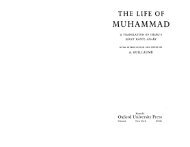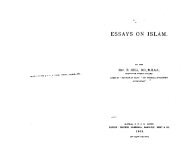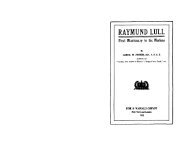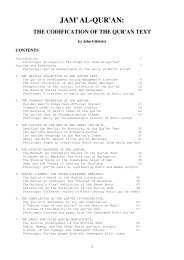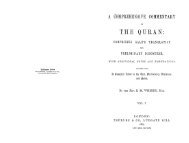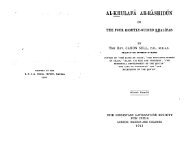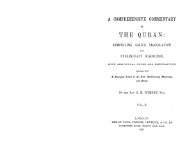Islam Its Belief and Practices - Radical Truth
Islam Its Belief and Practices - Radical Truth
Islam Its Belief and Practices - Radical Truth
You also want an ePaper? Increase the reach of your titles
YUMPU automatically turns print PDFs into web optimized ePapers that Google loves.
MARRIAGE AND DIVORCE 101<br />
CHAPTER V.<br />
Marriage <strong>and</strong> Divorce.<br />
The Muslim term Nikal;J., for marriage, literally<br />
means carnal conjunction, <strong>and</strong> it is defined by Muslim<br />
jurists to be a contract by which the husb<strong>and</strong> obtains<br />
possession of the wife, <strong>and</strong> is allowed to enjoy her, if<br />
there be no legal impediment preventing the same.<br />
Mul;J.ammad said: "Marriage is my custom, who<br />
dislikes it does not belong to me;" "Marry <strong>and</strong> multiply,<br />
so that I may be glorified by my nation over other<br />
nations." The Qur'anic injunction is found in Sura 4: 3<br />
"Marry what seems good to you of women, by twos, or<br />
threes, or fours; <strong>and</strong> if ye fear that ye cannot be equitable,<br />
then only one, or what your right h<strong>and</strong> possess."<br />
Conditions of the Validity of A Muslim Marriage.<br />
Marriage is a civil contract, <strong>and</strong> its validity does not<br />
depend upon religious ceremony, <strong>and</strong> the contract need<br />
not be reduced to writing. According to the explanation<br />
given by Sayyid Amir Ali, the validity of a marriage under<br />
Muslim law depends on two conditions: first, on the<br />
capacity of the parties to marry each other; secondly, on<br />
the celebration of the marriage according to the forms<br />
prescribed in the law where the marriage is celebrated,<br />
or which are recognised as legal by the customary law<br />
of the Mussalmans.<br />
As a general rule the capacity to contract a valid<br />
marriage rests on the same basis as the capacity to enter<br />
into any other contract. Among the conditions which<br />
are requisite for the validity of a contract of marriage<br />
are underst<strong>and</strong>ing, puberty <strong>and</strong> freedom, in the contracting<br />
parties, with this difference that while the first<br />
requisite is essentially necessary for the validity of the<br />
marriage, the other two conditions are required only<br />
to give· operation to the contract. The marriage contracted<br />
by a (minor) boy (possessed) of underst<strong>and</strong>ing is<br />
dependent for its operation on the consent of his<br />
guardian.<br />
A contract of marriage, like all other contracts,<br />
implies mutual consent, <strong>and</strong> when the parties see one<br />
another, <strong>and</strong> of their own accord agree to bind themselves,<br />
both having the capacity to do so, there is no<br />
doubt as to the validity of the marriage. Owing, however,<br />
to the privacy in which Eastern women generally<br />
live, <strong>and</strong> the difficulties under which they labour in<br />
exercise of their own choice in matrimonial matters, the<br />
Muhammadan law lays down the principle by which they<br />
may not only protect themselves from the cupidity of<br />
their natural guardians, but may also have a certain<br />
scope in the selection of their husb<strong>and</strong>s. For example,<br />
when a marriage is contracted on behalf of an adult<br />
person of either sex, it is an essential condition to its<br />
validity that such person should consent thereto, or,<br />
in other words, marriage contracted without his or her<br />
authority or consent is null, by whomsoever it may have<br />
been entered into.<br />
Among the I:lanafis <strong>and</strong> the Shi'as, the capacity of a<br />
woman, who is adult <strong>and</strong> sane, to contract herself in marriage<br />
is absolute. Among the Shafi'is <strong>and</strong> the Malikis,<br />
although the consent of the adult virgin is an essential to<br />
the validity of a contract of marriage entered into on her<br />
behalf, as among the I:lanafis <strong>and</strong> the Sh'ias, she cannot<br />
contract herself in marriage without the intervention of<br />
a wall (guardian). The wall's intervention is required by<br />
the Shafi'is <strong>and</strong> the Malikis to supplement the presumed



